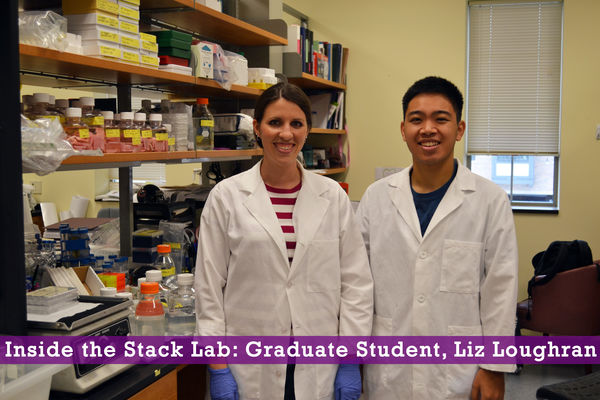Inside the Stack Lab: Graduate Student, Liz Loughran
September 9, 2015 | Stack Laboratory
When meeting researchers at the Harper Cancer Research Institute, I find that I’m always curious to know why these fascinating people do what they do. What makes them want to research cancer? For the past two years, Graduate student, Elizabeth (Liz) Loughran, has been working on her Ph.D. under the guidance of Dr. Sharon Stack. “I never really thought about cancer until I was in the 8th grade when my grandma was diagnosed with esophageal cancer which quickly lead to her premature death. That was my first exposure to cancer which must have been a factor in my decision to study cancer.” During her sophomore year at the University of Notre Dame, Loughran worked in a lab focused on breast cancer. “Women’s cancers have become a research interest for me. It’s something I truly care about, especially since my mother was diagnosed with and beat breast cancer. My mother’s cancer was a key factor in deciding to research cancer in graduate school.”

Loughran has two main projects at this time. One is studying the effects of age on peritoneum, the tissue that lines the abdominal cavity where ovarian cancer spreads. She seeks to uncover how age-related changes affect metastatic success of ovarian cancer. In her second project, she is investigating the effects of parity, or the number of births a woman has had, on ovarian cancer metastasis. The Stack lab has carried out tumor studies using mice that have given birth to zero, one or three litters of pups, in order to uncover the effects of parity on ovarian cancer metastasis. For humans, the odds of being diagnosed with ovarian cancer decreases in women who have given birth, but the effects of parity on metastasis are understudied.
Very few laboratories are taking the same approach as the Stack Lab. More often researchers are focused on studying the cancer cells themselves and fail to think about how the health or environmental status of the person (or animal) getting the cancer affects cancer progression. Dr. Sharon Stack recognizes the importance of looking at host differences such as obesity, age and parity.
Having multiple projects makes for busy days, which is why Loughran is so grateful for her two intelligent, and very dedicated, Notre Dame undergraduate students working with her in the Stack lab. Currently, Loughran has two undergraduate students working with her. Annemarie Leonard (sophomore) and Ryan Phan (senior) are interested in going to medical school. Working this past summer and multiple hours a week during the semester has given them a good base of lab experience. Most labs at the Harper Cancer Research Institute welcome undergraduate students who are interested in research. They can work and learn under the guidance of graduate students and postdoctoral fellows. Loughran says, “They are both extremely helpful to me. I really want to expose them to how the research world works, so that when they’re doctors they are better able to understand the research behind their practices. I think it’s ideal for every undergraduate heading to medical school to be exposed to research.” Loughran has not yet decided on a specific career but she is very interested in education and would not be surprised if teaching is somewhere in her future.